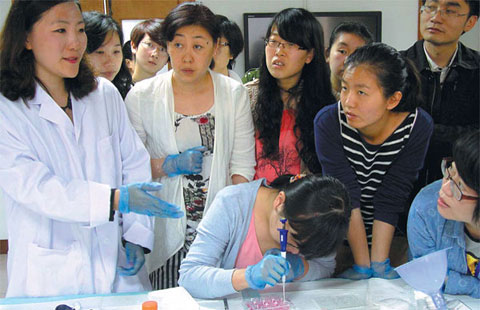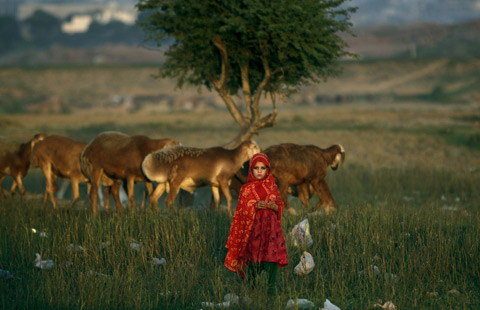Brave new palate
Updated: 2014-06-21 07:18
By Lucy Cheung (China Daily)
|
||||||||
Daring to rethink whatmakes food has propelled Noma's chef to the top of his profession, as Lucy Cheung discovers in Copenhagen.
Down by the dock, in an old gray stone warehouse, stands the newly re-crowned "Best Restaurant in the World 2014", tucked among construction sites in the bohemian Christianshavn quarter of Copenhagen. Noma's Danish-Macedonian head chef and co-owner Rene Redzepi, chewing an apple, offers some dark brown sauce for me to try.
"That's grasshopper. We've fermented grasshopper for six months." Sipping the thick barley-mix sauce, my taste buds encounter an organic, strong new flavor that doesn't register with any existing impression I have of insects.
|
Noma's Danish-Macedonian head chef and co-owner Rene Redzepi at the "Best Restaurant in the World 2014", in Copenhagen. Kaper Bent Rasmussen / For China Daily |
What motivates this restaurant, he says, "is delicious flavors and surprise".
After losing the No 1 ranking last year to Spain's El Celler de Can Roca, Noma reclaimed the top spot on the list of the Oscars of the food world it is Noma's fourth crown since 2010.
Held annually since 2002, the World's 50 Best Restaurants awards are run by London-based Restaurant magazine, and they have become tremendously influential. Much of the awards' cachet comes from the peer driven way they are decided: more than 900 chefs, food writers and gourmands around the world vote each year.
From guiding the high-profile new Nordic cuisine movement with Claus Meyer, co-founder of Noma, 10 years ago, to getting away from set rules and moving on with nonstop exploration of the unknown, Redzepi has led a lab for experimenting with ingredients as well as a distiller of a Scandinavian regional spirits.
The popularization in Denmark of skyr, a type of fresh cheese from Ice-land, and the groundbreaking launch of sea buckthorn on Noma's menu, are just two examples of Redzepi's effort to awaken Scandinavians' taste buds.
But discovering local Nordic ingredients is only the start. The idea of cooking with diversity came to him after he traveled many times to Thailand, Mexico and Brazil in search of ingredients some years ago.
Rene says he thought to himself: "OK, let's stop being such self-righteous Westerners. Maybe we are missing out." And he discovered that ants taste like lemongrass and live insects are bottom feeders that are not much different from lobsters, the "very expensive cockroach in the ocean".
Recently a Chinese intern cooked some sea cucumber at the restaurant's weekly team-sharing cooking event.
"It was revolting for a Scandinavian to see that slimy, squelching thing," Redzepi says. "But I always try it, and it turned out to be inspirational. It is always about the taste."
He is impressed by the TV documentary A Bite of China, and says he is astonished to see how people from the Inner Mongolia autonomous region process milk.
"The majority of agricultural land is feeding pigs, but we only have five or six pork dishes," he says.
"It is extraordinarily important to look to other regions around the world to learn ancient ways to cook food and try to adapt it with our ingredients and our microclimate."
In early 2015, Redzepi will move Noma to Japan for two months, to be closer to one of his inspirational sources.
Fifteen years ago, to work directly with farms was unusual for chefs in Scandinavia. Thinking back, Redzepi recognizes the influence of his family's farming background on the fact that Noma works directly with two farms less than an hour's drive away, getting most ingredients from the island of Zealand and the southern tip of Sweden.
Entering the world of chefs, how-ever, was completely accidental: "I was 15, a bad kid, smoked a lot, used to get into fights. I was angry and I didn't care." He says he was kicked out of school in the 9th grade and followed his best friend to a cooking school.
He'd found his passion, but was in a "brutal world" after six months in school.
He had to find an apprenticeship, where the marching orders were "do the job fast and don't fall behind".
He became an adult through working insane hours in the Michelin three-star restaurant elBulli in Spain, The French Laundry in the United States and Kong Hans Kaelder in Copenhagen, before he was contacted by established chef and culinary ideologist Claus Meyer in 2002.
The two, with some top Scandinavian chefs in 2004, formulated the "new kitchen manifesto". In the past decade, Noma has embodied the core elements in the statement with fresh, local ingredients and gastronomic diversity in focus.
On a trip to Greenland, where Redzepi traveled to hunt musk ox, he got stuck in a storm at an abandoned US military base, where he stayed for about five days. The impossible situation served as a reminder to walk out of his comfort zone.
Open-minded as he is, however, some ethnic foods, such as rotten shark from Iceland and stinky tofu from China, are beyond his palate.
Apart from cooking. Redzepi has published two books on cooking. The latest, A Work in Progress: Journal, Recipes and Snapshots, came out last October.
"Writing is a way to distill your reality," he says. "But I hate it: It's much easier to make a sauce."
Contact the writer at features@chinadaily.com.cn
|
Dishes by Redzepi focus on fresh, local ingredients and gastronomic diversity. |
(China Daily 06/21/2014 page12)

 Council of Fashion Designers of America Awards
Council of Fashion Designers of America Awards
 Fan Bingbing, first Chinese actress in Barbie Hall of Fame
Fan Bingbing, first Chinese actress in Barbie Hall of Fame
 Awarding ceremony of 2014 hito Pop Music held in Taipei
Awarding ceremony of 2014 hito Pop Music held in Taipei
 Zhao Liying's photo shoot for Children's Day
Zhao Liying's photo shoot for Children's Day
 'Taken 2' grabs movie box office crown
'Taken 2' grabs movie box office crown
 Rihanna's 'Diamonds' tops UK pop chart
Rihanna's 'Diamonds' tops UK pop chart
 Fans get look at vintage Rolling Stones
Fans get look at vintage Rolling Stones
 Celebrities attend Power of Women event
Celebrities attend Power of Women event
Most Viewed
Editor's Picks

|

|

|

|

|

|
Today's Top News
Greek PM salutes 'a game changer'
Hainan expands US presence to Boston
US to send 300 military advisers to Iraq
Evacuation plans made for Chinese workers in Iraq
Evacuation plans made for Chinese workers in Iraq
US citizens arrested on terror charges
Bomb plot defendant denied files by court
Rare stamp sets record at New York auction
US Weekly

|

|









